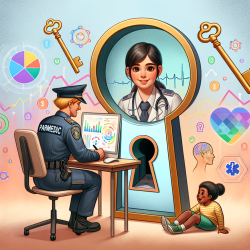Understanding Role Identity Dissonance
The study explored the concept of role identity dissonance among paramedics, a condition where there is a conflict between perceived role requirements and the ability to fulfill these roles. This dissonance often leads to significant emotional and psychological distress. The researchers found that chronic, identity-relevant disruptive events can cause emotional and psychological distress among paramedics. While some paramedics were able to recalibrate their sense of self, others found the dissonance irreconcilable, leading to disability and lost time from work.Applying Findings to Online Therapy
For online therapy practitioners, particularly those working with children, understanding role identity and its potential dissonance can lead to more effective and empathetic service delivery. Here are some actionable steps based on the research findings:- Recognize Role Salience: Just as paramedics derive a sense of identity from their role, therapists should recognize the importance of their role in a child's life. This means being aware of the expectations children and their families have from therapy sessions.
- Address Role Dissonance: Similar to paramedics, therapists may experience dissonance when they feel they are not meeting the needs of their clients. It's crucial to address these feelings through professional development and peer support networks.
- Recalibrate Expectations: The study found that recalibrating one's sense of self can mitigate distress. Therapists should regularly evaluate their expectations and adapt to the evolving needs of their clients, especially children who may have varying developmental needs.
- Enhance Training: Just as paramedics benefit from comprehensive training, therapists should receive ongoing education to handle a wide range of scenarios. This can include training in dealing with children with special needs or those who have experienced trauma.
Encouraging Further Research
The study also highlights the importance of theoretically informed social science perspectives in understanding mental health. For online therapy practitioners, engaging in or supporting further research can provide deeper insights into effective therapeutic techniques and improve service delivery. Here are some ways to encourage further research:- Collaborate with Researchers: Partner with academic institutions to conduct studies on the effectiveness of online therapy for children.
- Support Peer-Reviewed Publications: Contribute to and stay updated with the latest research by subscribing to journals and attending conferences.
- Implement Evidence-Based Practices: Regularly update therapy practices based on the latest research findings to ensure the highest quality of care.
Conclusion
By understanding and addressing role identity dissonance, online therapy practitioners can enhance their service delivery and create better outcomes for children. Recognizing the importance of role salience, addressing dissonance, recalibrating expectations, and enhancing training are key steps to achieving this. Additionally, encouraging further research can provide deeper insights and improve the overall quality of online therapy services.To read the original research paper, please follow this link: Role Identity, Dissonance, and Distress among Paramedics.










